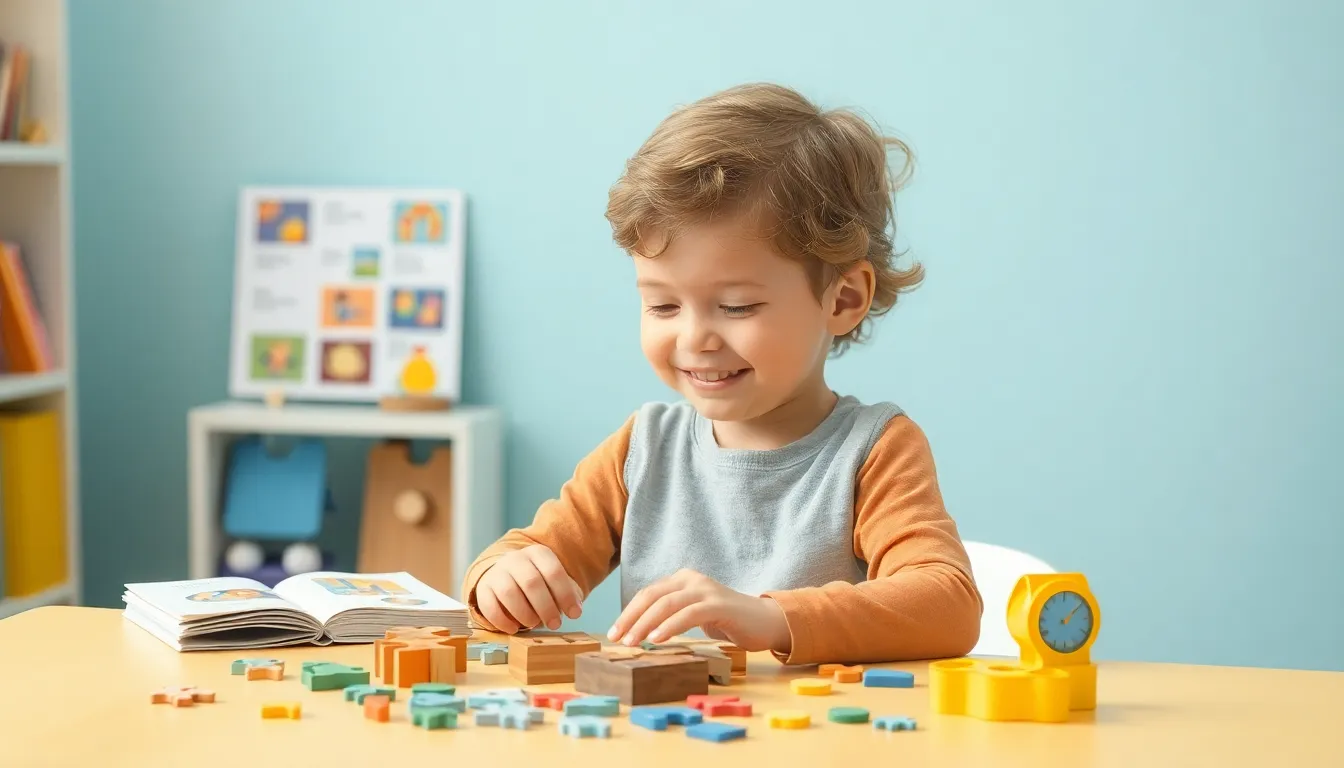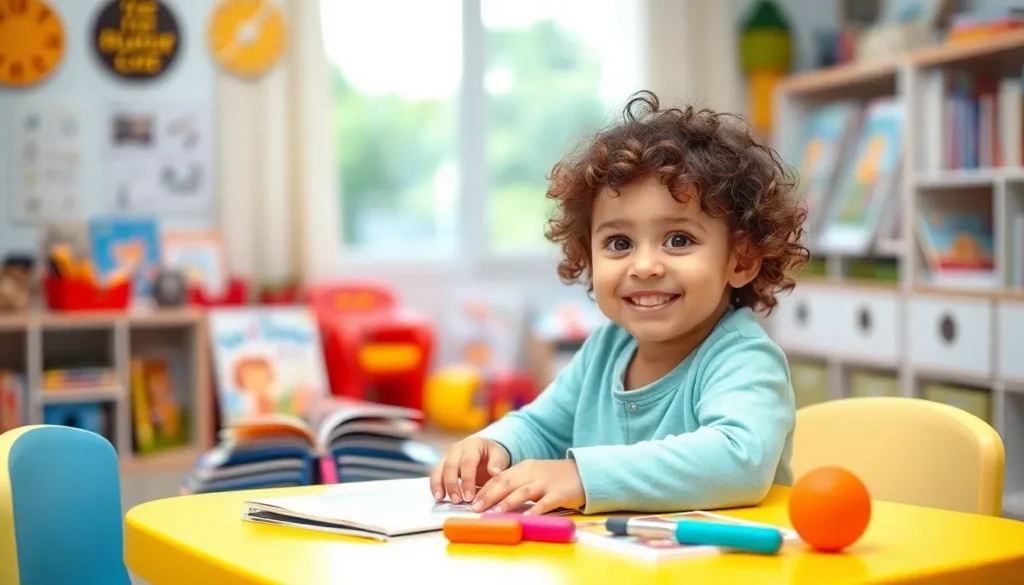Table of Contents
ToggleGetting little ones ready for preschool can feel like preparing for a mini Olympic event. With all the excitement, parents often wonder if their child is ready to tackle the world of books. Preschool reading readiness isn’t just about knowing the alphabet; it’s about sparking a love for stories and nurturing a lifelong passion for learning.
Understanding Preschool Reading Readiness
Preschool reading readiness includes several key elements that prepare children for literacy. Emphasizing the love of stories alongside foundational skills proves essential for early learners.
What Is Preschool Reading Readiness?
Preschool reading readiness refers to a child’s ability to engage with books and develop skills necessary for reading. Recognizing letters, understanding sounds, and developing vocabulary all contribute to this readiness. Engaging with stories promotes comprehension and fosters curiosity. Exploring pictures in books also enables children to make connections and build narratives, enhancing overall cognitive development.
Importance of Early Reading Skills
Early reading skills provide a critical foundation for future learning. Children’s ability to decode words and comprehend texts influences their academic success. Studies indicate that children who excel in reading during preschool showcase improved communication and problem-solving abilities later in life. Encouraging these skills cultivates independence and confidence, empowering children to explore learning opportunities. Parents who promote early reading often see positive long-term impacts on their child’s literacy journey.
Factors Influencing Reading Readiness

Reading readiness in preschoolers hinges on various crucial factors. Recognizing these elements can help parents and educators foster early literacy.
Cognitive Development
Children’s cognitive development plays an integral role in reading readiness. Memory, attention span, and problem-solving skills enhance their ability to understand stories. Engaging in activities that promote critical thinking strengthens these cognitive skills. Research shows that children with robust cognitive foundations often excel in early literacy. Utilizing puzzles or simple games helps stimulate this growth, creating a fertile ground for learning.
Language Exposure
Exposure to language significantly impacts the development of reading skills. The quantity and quality of interactions children have with adults shape their vocabulary and comprehension. Conversations that include open-ended questions encourage children to think critically about what they hear. Reading aloud daily introduces new words and concepts, further enriching their language experience. Studies support that children regularly exposed to diverse language environments show advanced reading readiness.
Social and Emotional Readiness
Social and emotional readiness influences a child’s ability to engage with reading. Children who feel secure and supported demonstrate greater motivation to explore books. Positive interactions with peers and caregivers build confidence in sharing their thoughts on stories. Participating in group reading sessions fosters collaboration and communication skills. Research indicates that emotionally and socially prepared children approach reading with enthusiasm, enhancing their overall literacy journey.
Activities to Enhance Reading Readiness
Engaging activities play a crucial role in developing preschool reading readiness. These activities foster essential skills through play and interaction.
Interactive Storytime
Interactive storytime creates an engaging environment for children. Choose age-appropriate books with vibrant illustrations and simple narratives. Encourage children to participate by asking questions about the story and allowing them to predict outcomes. Use props or puppets to bring characters to life, making the experience more dynamic. Incorporating songs or rhymes related to the story helps reinforce language patterns. Frequent storytime sessions yield positive results in vocabulary acquisition and comprehension.
Phonics Games
Phonics games enhance children’s understanding of sounds. Use flashcards showcasing letters and pictures, promoting letter-sound connections. Create simple audio-visual matching games where children identify corresponding sounds. Incorporate fun activities such as singing phonetic songs that reinforce sounds associated with each letter. Engaging in these games often leads to improved phonemic awareness, setting the foundation for reading success. Regular practice through play ensures children develop confidence in recognizing letters and their sounds.
Letter Recognition Exercises
Letter recognition exercises are essential for building foundational literacy skills. Employ activities like letter scavenger hunts where children find items around the house or classroom starting with specific letters. Use engaging worksheets that encourage tracing letters and identifying uppercase and lowercase forms. Introducing digital apps focused on letter recognition combines learning with technology, enhancing motivation. Frequent repetition through varied exercises helps solidify children’s familiarity with letters, ultimately preparing them for reading.
Assessing Reading Readiness
Assessing preschool reading readiness involves utilizing various tools and observation strategies to gauge a child’s literacy development.
Tools and Checklists
Checklists serve as valuable resources for tracking a child’s progress. Effective tools often include developmental milestones relating to reading skills. Parents can use simple checklists to note a child’s ability to recognize letters and express interest in books. Observing skills like listening comprehension when stories are read can indicate readiness as well. Many preschool readiness assessments include standardized evaluations to measure skills comprehensively. Components such as vocabulary size and phonemic awareness are crucial for monitoring development effectively.
Observational Strategies
Observation plays a vital role in understanding a child’s reading readiness. Parents should watch for children’s interactions with books, noting their engagement levels during storytime. Gathering insights from playful activities enhances the assessment process. Tracking responses during interactive reading sessions can reveal a child’s comprehension abilities. Observing whether a child enjoys discussing stories highlights their interest in literacy. Noticing how they ask questions or make predictions about character actions also signifies engagement. Consistent documentation of these observations helps with tailoring future learning activities to individual needs.
Fostering preschool reading readiness is a vital step in a child’s educational journey. By focusing on engaging activities and nurturing a love for stories, parents can lay a strong foundation for literacy. The interplay of cognitive development, language exposure, and social-emotional readiness plays a crucial role in shaping a child’s reading skills.
With the right support and encouragement, children can develop independence and confidence in their abilities. This early investment in reading not only enhances communication and problem-solving skills but also sets the stage for lifelong learning. Embracing these strategies ensures that children are well-equipped to thrive in their future academic endeavors.







